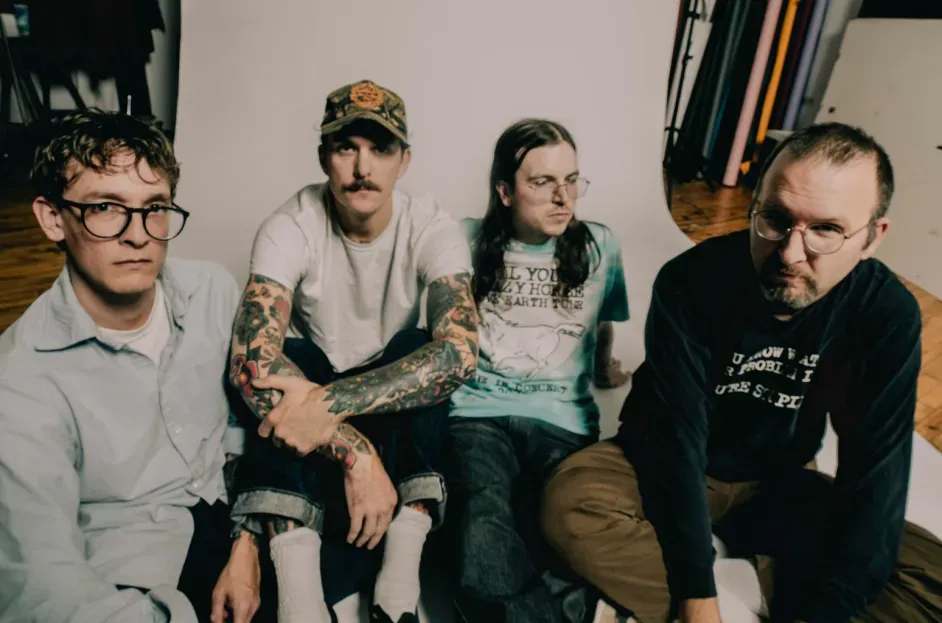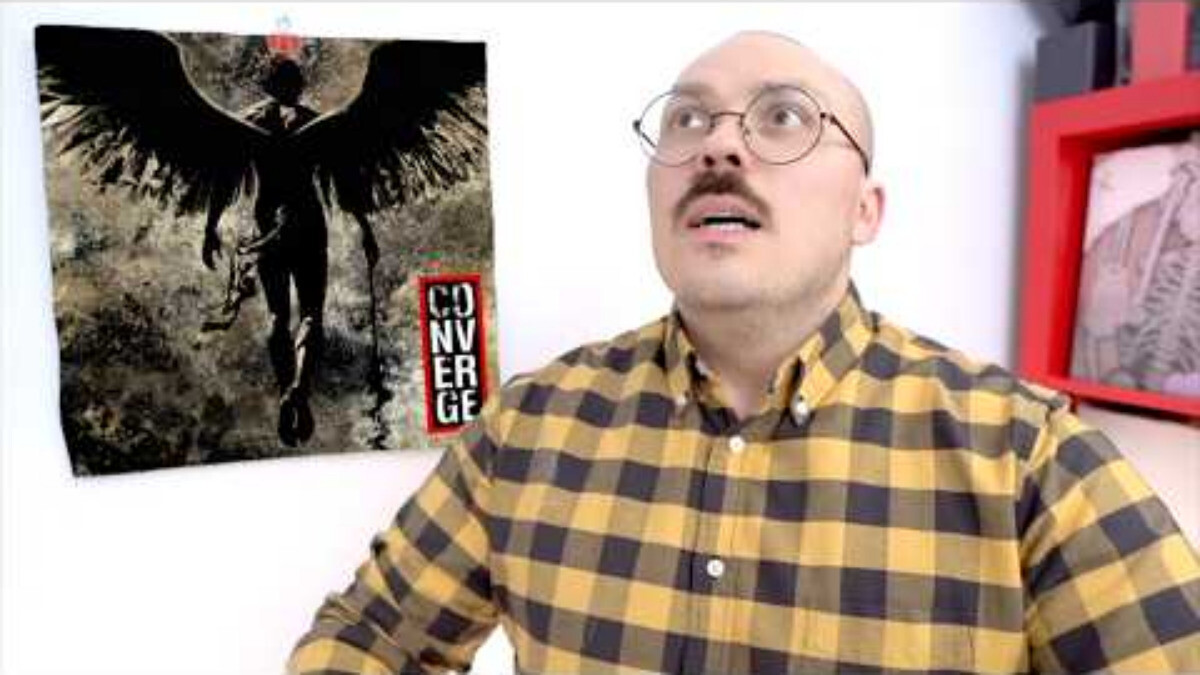Last month, Brooklyn rock band Hotline TNT released their fourth LP, Raspberry Moon, a continuation of the sonically rich guitar music that made them the indie darlings they are.
I sat down with frontman Will Anderson to discuss the making of the record, touring, and managing band dynamics.
This interview has been edited for clarity and length.
Leah @ TND: Because you've done such a media blitz for this record I'm gonna try to stray from like the shit that you've been asked 10 million times. I don't want you to feel like you're reading off of a script because I feel like that's happened a lot when I interview artists toward the end of them doing a bunch of interviews. But, I feel like the one touchpoint that is kind of necessary to talk about is the conceit of the record being about collaboration and having this solidified lineup. What are the liberties that you would say you have now with this like final solidified lineup?
Will Anderson: Yeah, I mean that is definitely the question that everyone is asking every single time. I understand it's part of how it is, but yeah, I would say no matter how much that angle is pushed as far as like, "oh, it's always been your band but now it's not" it's a group effort. I'm not gonna shy away at all from "yeah, this album was made by these four people." It wouldn't have happened this way if it was just me and that's just like every album.
It's it's a snapshot of what's been happening for the last X amount of time and Haylen, Mike, Lucky, and I were in that room for those weekends or whatever days it was that we made the album and it would have been different if it wasn't those four people.
Do you feel as though it wasn't really difficult at all to give way for the collaboration since you're used to making a lot of these records mostly by yourself?
I wouldn't say it was easy, no. There were difficulties for sure, but that's anytime you're working with other people. There's gonna be tension – and that's where some of the most interesting moments can come – but that's not unique to this album. Even with Cartwheel, there were no other players on the album, but I butted heads with the producers for sure. But again, that's where the the cool stuff happens.
If I have an idea, you can have a different idea. We met somewhere in the middle and that's that's where the album happened. This time there were four cooks in the kitchen as far as people performing the music, but we just kind of had to figure out some kind of compromise whenever it got tense. That's what Raspberry Moon was birthed from.
How would conflict [with bandmates] differ from butting heads with a producer, who ultimately you're paying to provide their skill set and their talents ,versus bandmates who are more on an equal playing field?
I think it's tough. As much as we want to say it's an equal playing field, I think everybody in the band understands that I've been doing this for like seven, eight years now and some of these guys have only been doing it for a year or so. I tried to make it open to like yeah your guys's names are on this and like you're the ones dedicating your time and your bodies and like putting other stuff on hold to chase this goal with me, but ultimately I think there's an understanding that no matter how much we push the "it's a band" narrative, it's still gonna have "this is Will Anderson's new album with his lineup, but it's still Will Anderson's project." I think there was a respect for when there's a tiebreaker I'm gonna be kind of the JD Vance of Hotline TNT and get that Senate bill pushed through.
Has being that authoritative tiebreaker taught you anything about managing dynamics within a band?
Yeah, definitely. I think it plays out in all sorts of parts of my life. There's definitely times when as the band leader there are jobs that follow me that I don't want to do but I'm just gonna do it. The band is not gonna stop even if there's a difficult situation that has to be dealt with and that might fall on me as the face or the frontman. I'm asking these guys to kind of be "Julia's warriors" here and we're all kind of doing battle with the music industry. Sometimes being the captain means falling on the grenade or the knife or the sword, whatever the term is. Sometimes you gotta eat shit and like say "Hey, I'm sorry." It might not be what's in my head or my heart but you just kind of have to keep morale high.
A lot of your touring has been as an opener for bigger bands. Is that what you prefer or are those the opportunities that have ended up presenting themselves in the last couple years?
We would prefer to be the headliner in an arena setting for sure, but we're not there yet. Every tour is different. I wouldn't say I could do a blanket statement and be like, "oh we love doing the opening slot for every single opportunity we get." There's a strategy to some of it. We can't keep playing the same rooms every single time and playing in front of the same audience. There's a ceiling for what we can do playing the exact same rooms every single time. We've got to do it, gotta expand some one way or another.
I read your interview with Stephen Hyden about your change in philosophy about 21+ shows. Do you feel like your perspective on that has changed because of this specific trajectory Hotline has gone on, or do you think it varies on a band-to-band basis? I know this has been a discourse touch point forever.
For me, it's something I held on to for a long time. I never thought I would ever waver on it. But at this point, it's time to let go of that. The business just has to grow and there just might not be an all-ages option for this particular night in this particular city, and like, It's okay, it happens. But then the next week they'll be like, "you know there's this 19 year old kid who drove two hours to try to see me play and he couldn't get into the show but he waited outside to have me sign his guitar," and it's like, yeah, I wish we would have stuck with it.
I would love every show to be all-ages, but being an all-ages venue is only one piece of this corporate music industry that we would love to tear down and start over. Even if it's all ages, that doesn't mean it's gonna be accessible or feel safe to every single person that wants to see us play. You gotta pick your battles.
I don't feel like this music is made for a certain age group, and it's still pretty important to me to be in touch with youth culture, and I still listen to new music all the time. Young people making music is what I want to hear. Unfortunately, I cannot stop my aging process – as much as I try but it's a battle. I don't necessarily feel like it's important to make sure most of my audience is teenagers, but I want them to feel welcome here. Obviously there are teenagers who still listen to my kind of music. It's a complicated thing. Turnstile I think is a great example. Those guys are the same age as me but obviously they're very in touch with young people and those audiences kind of skew younger.
Actually, what was really interesting, I went to the free show that they had at this park in Baltimore a month ago, and I think that's one of the only shows where there were no teenagers there. Everyone was either someone's young child or they were older than 20. It was an enormous crowd, but also it's their hometown.
They're a unique case and they've obviously said yes to a lot of opportunities, and the moment has been right for them, and they kept growing and growing and growing. The music itself is a whole different conversation about what you think of their their new album and stuff.
Our booking agent has very clear instructions from me to find as many all-ages venues as possible. That's still a high priority, but it's not a deal-breaker. It's not like we're gonna pass the city just because we can't. Every time we announce the tour, there's gonna be a few comments on Instagram saying "I can't get into the show." I'm like, "yeah, I'm sorry."
Raspberry Moon is out now.




What do you think?
Show comments / Leave a comment